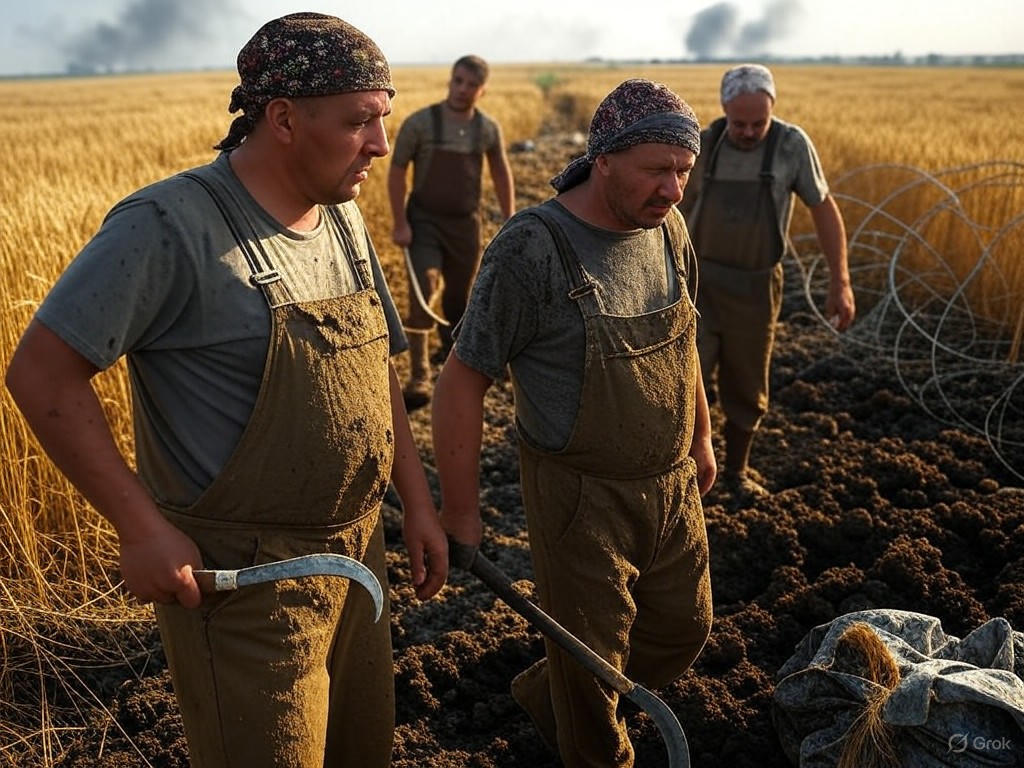Global Food Crisis: Ukraine’s Grain Exports Halted
In the vast, golden fields of Ukraine, where centuries of agricultural tradition have turned the Black Sea region into a global breadbasket, the roar of conflict has silenced the rhythms of harvest. As Russian forces continue their invasion, Ukraine's ability to export grain—once a cornerstone of international trade—has been severely hampered, rippling through global markets and deepening the food crisis. This disruption not only underscores the perils of geopolitics in an interconnected world but also highlights the urgent need for pragmatic, market-driven solutions to combat hunger. Drawing from a perspective that values free markets and limited government intervention, this editorial argues that while international aid efforts are necessary, long-term stability depends on fostering resilient trade networks and individual enterprise rather than expansive state controls.
Ukraine, often called the "granary of Europe," has long been a linchpin in global food security, exporting massive quantities of wheat, corn, and barley to regions as far as Africa and Asia. Before the war, it supplied about 10% of the world's wheat exports, according to pre-conflict data from agricultural experts. However, since February 2022, blockades in the Black Sea and damaged infrastructure have slashed exports by over 80%, as reported by the United Nations. This bottleneck has sent shockwaves through commodity markets, driving up prices and exacerbating hunger in vulnerable nations. From Egypt, where bread subsidies strain national budgets, to Kenya, where families face soaring costs for staple grains, the fallout is palpable. A center-right lens reminds us that such disruptions stem from unchecked geopolitical aggression, but the path to recovery lies in bolstering free-market mechanisms—such as streamlined trade agreements and private-sector innovation—rather than relying on bloated government programs that often stifle efficiency.

Ukrainian farmers assess damaged crops amidst ongoing hostilities, illustrating the human resilience required to maintain traditional agricultural values in the face of modern geopolitical turmoil.
The Geopolitical Roots of the Food Crisis
The Russia-Ukraine war is not merely a regional skirmish; it is a stark reminder of how geopolitics can upend global supply chains. Ukraine's grain exports, which totaled around 50 million metric tons annually before the conflict, have been curtailed by mined ports, disrupted rail lines, and export restrictions imposed by both nations. Russia, a major exporter itself, has weaponized food as part of its strategy, further entangling the crisis in broader power struggles. This has led to a domino effect: rising global grain prices have pushed nearly 50 million more people into acute hunger, according to estimates from the World Food Programme.
From a center-right perspective, this situation exemplifies the dangers of state-driven conflicts interfering with free markets. Governments, when overreaching, can exacerbate vulnerabilities by imposing sanctions or export bans that ripple unpredictably. For instance, while Western sanctions on Russia aim to deter aggression, they have inadvertently tightened global supply constraints Wall Street Journal. A more balanced approach would prioritize diplomatic efforts to reopen trade routes, allowing market forces to self-correct. Traditional values of self-reliance and innovation, embodied in Ukraine's farming communities, could be amplified through incentives for private investment in alternative export pathways, such as overland routes through Poland or Romania.
Yet, the crisis also reveals opportunities for market adaptation. Entrepreneurs in logistics and agriculture are already innovating, using digital platforms to reroute shipments and hedge against volatility. This grassroots resilience underscores why limited government intervention—focusing on regulatory reforms rather than direct aid—can empower individuals and businesses to thrive. As we navigate this turmoil, it's essential to avoid the pitfalls of excessive bureaucracy, which often delays response and diverts resources from those who need them most.
Evidence of Exacerbated Hunger and International Responses
The evidence of this food crisis is undeniable, with hunger rates climbing in low-income countries that depend on Ukrainian grain. In sub-Saharan Africa, for example, nations like Somalia and Ethiopia have seen food prices surge by 30–50% since the war began, pushing millions toward famine Food and Agriculture Organization. This is not just a matter of supply; it's a failure of geopolitical stability to support efficient markets. Data from the International Food Policy Research Institute indicates that the conflict has reversed years of progress in reducing global hunger, with over 828 million people facing food insecurity in 2022 alone.
International aid efforts have stepped in to mitigate the damage, with organizations like the United Nations and the European Union coordinating shipments through alternative channels. However, these initiatives often highlight the limitations of top-down solutions. For instance, the Black Sea Grain Initiative, brokered in 2022, temporarily allowed Ukrainian exports to resume, but its fragility underscores the need for sustainable, market-based alternatives Foreign Affairs. A center-right approach advocates for aid that empowers local farmers and traders—perhaps through microloans or trade pacts—rather than perpetuating dependency on government handouts.
To illustrate, consider the role of private enterprises in bridging gaps. Companies like Cargill and Archer Daniels Midland have pivoted to source grains from other regions, demonstrating how free-market adaptability can stabilize supplies without massive state intervention. This evidence points to a broader truth: when governments limit their role to facilitating trade and enforcing contracts, innovation flourishes, and hunger diminishes.

Aid workers deliver emergency grain supplies in a Kenyan village, symbolizing the immediate human impact of disrupted exports and the need for strategic international cooperation.
Toward a Resilient Future: Free-Market Solutions and Traditional Values
In conclusion, the Russia-Ukraine war's disruption of grain exports has thrust global food security into crisis, amplifying hunger and exposing the fragilities of our interconnected world. While immediate aid efforts are crucial, a center-right perspective urges a shift toward free-market principles that promote limited government involvement, encourage private innovation, and honor traditional values like hard work and self-sufficiency. Policies that reduce tariffs on alternative grain sources, invest in agricultural technology through public-private partnerships, and foster diplomatic stability can help mitigate these risks without overextending state power.
For instance, international bodies could prioritize trade liberalization agreements that allow countries like Ukraine to diversify their markets, reducing vulnerability to geopolitical shocks World Bank. By empowering individuals and businesses to lead the recovery, we can build a more resilient global food system—one that values economic freedom over bureaucratic control.
As we reflect on the human stories behind these statistics—farmers in Ukraine tilling fields under threat, families in distant lands skipping meals—we must commit to solutions grounded in reason and tradition. Only then can we turn the tide on this crisis and secure a future where food security is not a casualty of conflict.

